Not only were the sciences seen as producing different kinds of knowledge, then, but these epistemic variations could also be understood in terms of different patterns of work organisation and control that in turn depended upon particular societal and organisational contingencies. This implied that when these latter changed, so too should the patterns of intellectual authority and co-ordination and, eventually, research priorities, epistemic judgements and outcomes. At least in principle, then, this approach to analysing the sciences enables us to understand how recent changes in state-science relations in many countries of project-based funding of universities, can be expected to affect intellectual development and organisation in different fields.
02.07.2013
University















